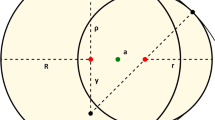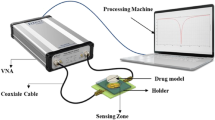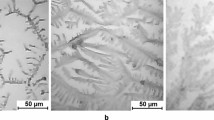Abstract
FOLLOWING our experiments in relation to the influence of electric current on the formation of Liesegang rings, it has been found that silver nitrate (diluted) drops on chromogelatine cause a potential difference of nearly 80 millivolts. The silver nitrate has a positive, and the chromogelatine a negative, potential. This potential difference lasts only so long as silver dichromate is being formed. At first it decreases very quickly, and at the same time with the quick appearance of the rings; later, the rate of decrease becomes slower, parallel with the slower formation of the rings. If the silver nitrate–chromo-gelatine pair is short-circuited (by short-circuiting the electrodes), then a change is observed in the appearance of the Liesegang rings; normal rings are shown in Fig. 1 and modified rings in Figs. 2 and 3.
This is a preview of subscription content, access via your institution
Access options
Subscribe to this journal
Receive 51 print issues and online access
$199.00 per year
only $3.90 per issue
Buy this article
- Purchase on Springer Link
- Instant access to full article PDF
Prices may be subject to local taxes which are calculated during checkout
Similar content being viewed by others
Author information
Authors and Affiliations
Rights and permissions
About this article
Cite this article
CHRISTOMANOS, A. Electric Potential of Solutions as a Cause of the Formation of Liesegang Rings. Nature 165, 238–239 (1950). https://doi.org/10.1038/165238b0
Issue Date:
DOI: https://doi.org/10.1038/165238b0
This article is cited by
-
Liesegang Rings on Metallic Bases
Nature (1953)
Comments
By submitting a comment you agree to abide by our Terms and Community Guidelines. If you find something abusive or that does not comply with our terms or guidelines please flag it as inappropriate.



